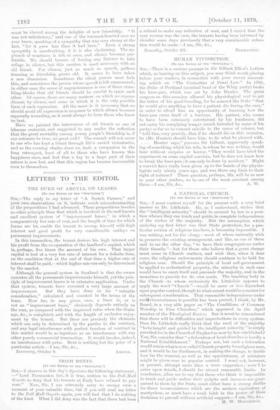LETTERS TO THE EDITOR.
THE DUKE OF ARGYLL ON LEASES.
[TO TUE EDITOR OF TILE " SPECTITOR1
Sint,—The reply to my letter of " A Scotch Farmer," and your own observations on it, indicate much misunderstanding of the propositions I had advanced. These propositions involve no other principle than that which is involved in the well known and excellent system of "improvement leases," in which a comparatively low rate of rent, and the length of time for which farms are let, enable the tenant to recoup himself with high interest and good profit for very considerable outlays on permanent improvements.
In this transaction, the tenant derives his high interest and his profit from the co-operation of the landlord's capital, which is, perhaps, five times the amount of his own. That larger capital is lent at a very low rate of interest for a definite time, on the condition that at the end of that time a higher rate of interest shall be paid,—which higher rate can only be determined by the market.
. Although the general system in Scotland is that the owner executes all the permanent improvements himself, yet-the prin. ciple of improvement leases is in extensive application. Under that system, tenants have executed a very large amount of improvement. But they have done so for " valuable consideration," calculated and counted in the terms of the lease. How far, in any given case, a lease is, or is not an "improvement lease," obviously depends entirely on the rent, as compared with the improved value when the drain- age, Ste., is completed, and with the length of exclusive enjoy-• meat by the tenant. But these are precisely the elements which can only be determined by the parties to the contract, and any legal interference with perfect freedom of contract in this matter would be as injurious as an interference with any other purely commercial transaction. It would involve, indeed, an interference with price. Rent is nothing but the price of a particular article.—I am, Sir, Sic.,
































 Previous page
Previous page